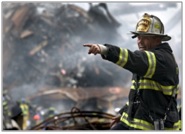 For those on the front-line of emergency response—firefighters, nuclear industry workers, police, military personnel—stress impacts every decision, sometimes with catastrophic consequences, in emergency situations. When responders become engulfed in the blaring lights, shouts and demands that occur in any emergency, they need to be equipped with tools and training for effective Decision Making Under Stress (DMUS). For those on the front-line of emergency response—firefighters, nuclear industry workers, police, military personnel—stress impacts every decision, sometimes with catastrophic consequences, in emergency situations. When responders become engulfed in the blaring lights, shouts and demands that occur in any emergency, they need to be equipped with tools and training for effective Decision Making Under Stress (DMUS).
To prepare for situations that call for maximum decision making, responders need focused training on how to build more stress-resilient teams and organizations. DMUS for Emergency Responders provides tools and techniques to help all employees—at every level—make effective decisions before, during and after an emergency. Case studies, examples and activities will focus on the types of decisions and stressors unique to those working in emergency response fields. HPS can adapt this course to particular fields and situations.
- Nuclear industry employees and leaders
- Emergency responders
- Law enforcement
- First responders
- Firefighters
- Homeland security
- Military/Paramilitary
- Anyone making decisions under stress
- How people really make decisions (it's not how you think)
- The impact of stress on decision making
- Linkages between stress, cognitive and emotional intelligences and decision making
- How your comfort zone impacts stress resilience, and therefore, decision making
- The cumulative effect of stress and how to stop the escalation
- Decision making practice
- Feedback on ARSENAL— a powerful developmental tool to measure and build stress resilience
- Tools for use before, during and after emergencies
- Development Plan to improve the seven best practices for building stress resilience
- Tools to enhance decision making under stress
- Feedback on the ARSENAL seven best practices
- Personal Development Plan to build resilience and improve decision making under stress
- Skills that can be applied at home in addition to the workplace
- A copy of The Stress Effect: Why Smart Leaders Make Dumb Decisions—And What to Do About It
- Detailed class notebook with additional resources
- Make better decisions in all situations
- Be able to make effective decisions under stress for longer periods of time
- Learn which tools to use before, during and after an emergency
- Work-Life Balance
- How to prepare the mind and body for fast-paced and emergency decision making
- Training targeted to the role level of participants for maximum learning and application
- Participants demonstrate decision making under stress
- Participants experience the physiological and cognitive effects of stress
- Observe real-time data showing the impact of stress
- Practice stress management techniques
- Create a Development Plan
About the Facilitator: Henry L. (Dick) Thompson, Ph.D., is the President and CEO of High Performing Systems, Inc., and the author of The Stress Effect: Why Smart Leaders Make Dumb Decisions—And What to Do About It, a groundbreaking and insightful resource that shows how stress is often the real culprit behind poor decision making and leadership failure.
Dr. Thompson’s 21-year military service resulted in first-hand experience in decision making under stress. During that time, he trained and led some of the most elite special operations teams in the world. He served as an officer with the U.S. Army Special Forces Group (Green Berets) in Vietnam and was decorated on several occasions for his heroism.
Dr. Thompson has created the DMUS training, ARSENAL Assessment and development process to build individual and organizational stress resilience.
To learn more about DMUS for Emergency Responders Call 800-535-8445.
|
